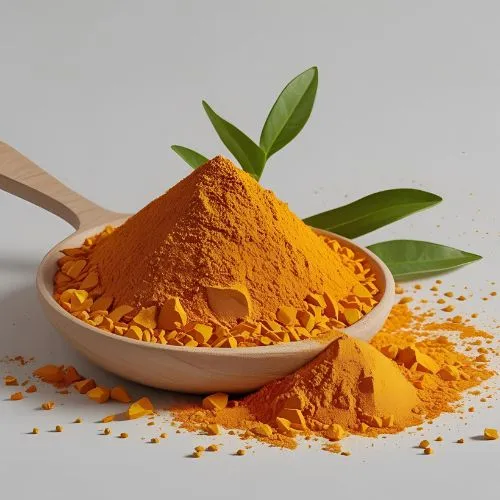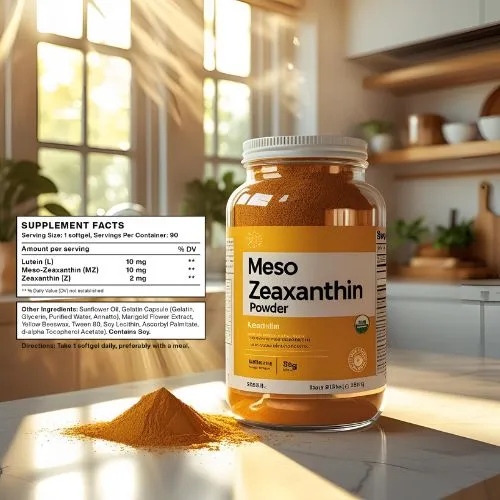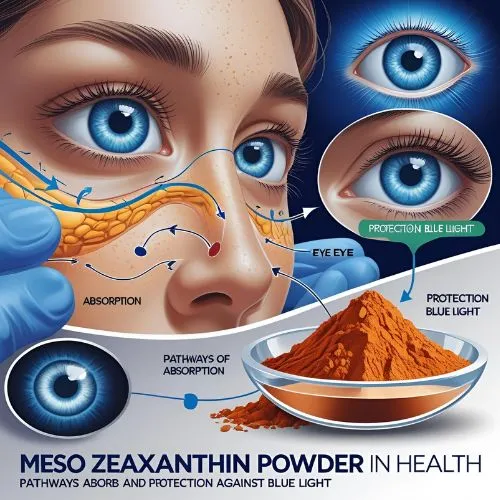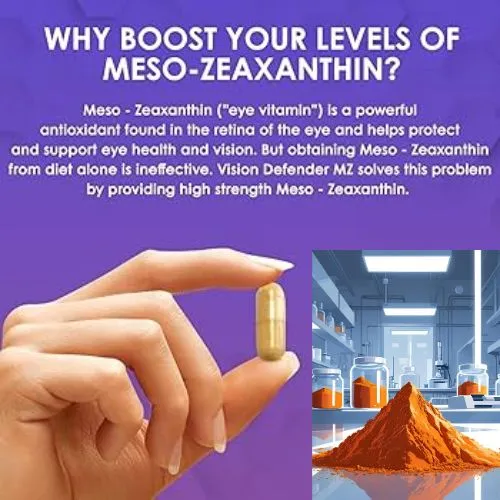How much meso zeaxanthin per day?
Meso zeaxanthin is a powerful antioxidant carotenoid that plays a crucial role in maintaining eye health. As more people become aware of its benefits, questions about the optimal daily dosage arise. In this comprehensive guide, we'll explore the recommended daily intake of meso zeaxanthin powder and its impact on eye health.

Recommended Daily Dosage of Meso Zeaxanthin Powder
Determining the ideal dosage of meso zeaxanthin powder can be complex, as it often depends on individual factors and specific eye health needs. However, research and clinical studies provide some general guidelines:
Standard Dosage Range
Most studies suggest a daily intake of 2-10 mg of meso zeaxanthin for optimal eye health benefits. This range is considered safe and effective for most adults. However, it's essential to note that meso zeaxanthin is often combined with other carotenoids like lutein and zeaxanthin in eye health supplements.
Factors Affecting Dosage
Several factors can influence the appropriate dosage of meso zeaxanthin powder:
- Age: Older adults may require higher doses due to decreased absorption and increased risk of age-related eye conditions.
- Eye health status: Individuals with existing eye conditions or higher risk factors may benefit from higher doses.
- Diet: Those with diets low in carotenoid-rich foods might need higher supplemental doses.
- Smoking status: Smokers may require higher doses to counteract oxidative stress.
Gradual Increase Approach
For individuals new to meso-zeaxanthin supplementation, it’s recommended to start with a lower dose, typically around 2-3 mg per day. Gradually increase the dosage over the course of several weeks, ensuring to monitor for any potential side effects or improvements in vision. This gradual approach helps the body adjust to the supplement while giving you the opportunity to track any positive changes in your eye health.

How Meso Zeaxanthin Powder Supports Eye Health?
Understanding how meso zeaxanthin powder benefits eye health can help appreciate the importance of proper dosing:
Antioxidant Protection
Meso zeaxanthin is a potent antioxidant that protects the retina from oxidative stress and free radical damage. It accumulates in the macula, the central part of the retina responsible for sharp, detailed vision. By neutralizing harmful free radicals, meso zeaxanthin helps maintain the integrity of retinal cells and supports overall eye health.
Blue Light Filtration
One of the unique properties of meso zeaxanthin is its ability to filter harmful blue light. In our digital age, exposure to blue light from screens and artificial lighting has increased significantly. Meso zeaxanthin acts as a natural blue light filter, potentially reducing eye strain and protecting against long-term damage from excessive blue light exposure.
Macular Pigment Optical Density (MPOD) Enhancement
Meso zeaxanthin, along with lutein and zeaxanthin, contributes to the macular pigment optical density (MPOD). A higher MPOD is associated with better visual performance and reduced risk of age-related macular degeneration (AMD). Regular supplementation with meso zeaxanthin powder can help increase MPOD, potentially improving visual acuity and contrast sensitivity.
Synergistic Effects with Other Carotenoids
While meso zeaxanthin is powerful on its own, it often works synergistically with other carotenoids, particularly lutein and zeaxanthin. This trio of macular carotenoids provides comprehensive protection and support for eye health. Many eye health supplements combine these carotenoids to maximize benefits.

Common FAQs About Meso Zeaxanthin Powder Dosage
As interest in meso zeaxanthin grows, several questions frequently arise regarding its dosage and usage:
Can I take meso zeaxanthin powder daily?
Yes, meso zeaxanthin powder can be taken daily. In fact, consistent daily supplementation is often recommended to maintain optimal levels in the eye tissues. However, always follow the dosage instructions provided by your healthcare provider or the product label.
Is it possible to overdose on meso zeaxanthin?
While meso zeaxanthin powder is generally considered safe, excessively high doses may lead to carotenemia, a harmless condition that causes yellowing of the skin. Stick to recommended dosages to avoid any potential issues. If you're concerned about overdosing, consult with a healthcare professional.
How long does it take to see benefits from meso zeaxanthin supplementation?
The timeframe for experiencing benefits can vary among individuals. Some people report improvements in visual performance within a few weeks, while others may take several months to notice significant changes. Consistency in supplementation is key for optimal results.
Can I get enough meso zeaxanthin from diet alone?
Meso zeaxanthin is not commonly found in the diet. While the body can convert some lutein to meso zeaxanthin, direct supplementation is often necessary to achieve optimal levels, especially for those at risk of eye health issues.
Are there any interactions with medications?
Meso zeaxanthin is generally well-tolerated and has few known interactions. However, if you're taking any medications, particularly blood thinners or medications for eye conditions, it's advisable to consult with your healthcare provider before starting meso zeaxanthin supplementation.

Conclusion
In conclusion, while the optimal dosage of meso zeaxanthin powder can vary based on individual needs, a range of 2-10 mg daily is generally considered safe and effective for supporting eye health. As with any supplement, it's crucial to consult with a healthcare professional before starting a new regimen, especially if you have existing health conditions or are taking medications.
For high-quality meso zeaxanthin powder and expert guidance on dosage and usage, feel free to contact us at info@yanggebiotech.com. Our team of specialists is dedicated to helping you achieve optimal eye health through premium, scientifically-backed supplements.
References
1. Nolan, J. M., et al. (2013). Macular pigment, visual function, and macular disease among subjects with Alzheimer's disease: an exploratory study. Journal of Alzheimer's Disease, 36(1), 197-205.
2. Bone, R. A., et al. (2007). Macular pigment response to a supplement containing meso-zeaxanthin, lutein and zeaxanthin. Nutrition & Metabolism, 4(1), 12.
3. Akuffo, K. O., et al. (2015). Sustained supplementation and monitored response with differing carotenoid formulations in early age-related macular degeneration. Eye, 29(7), 902-912.
4. Khoo, H. E., et al. (2019). Carotenoids and their isomers: color pigments in fruits and vegetables. Molecules, 24(24), 4498.
5. Bernstein, P. S., et al. (2016). Lutein, zeaxanthin, and meso-zeaxanthin: The basic and clinical science underlying carotenoid-based nutritional interventions against ocular disease. Progress in Retinal and Eye Research, 50, 34-66.

Based on your location and order quantity, you will have the opportunity to receive a limited time free shipping promotion!

Who we are


